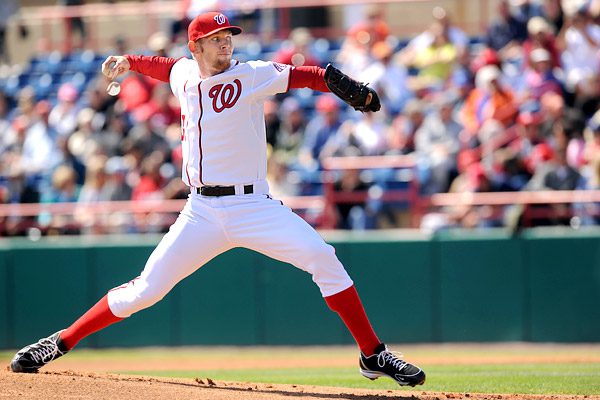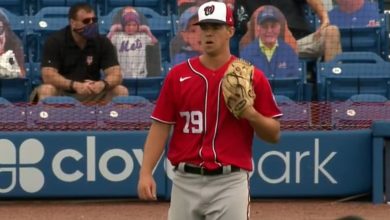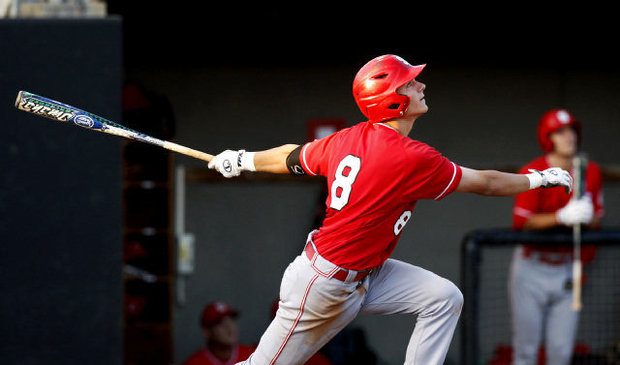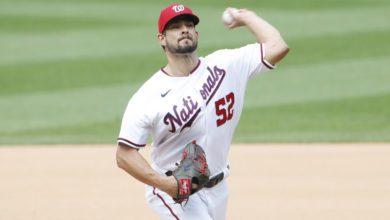

At some point in the very near future, one fairly popular man in the Washington Nationals clubhouse will be shut down for the remainder of the 2012 season, while the remaining 24 on the current roster battle their way to what they hope will be the franchise’s first World Series Championship in seven years of existence.
As the shut-down date looms ominously on the horizon, the fervent Stephen Strasburg debate reaches new levels of intensity with each passing day. An array of solutions that would enable the star pitcher to continue into the postseason have been proposed ad nauseam by experts with extensive knowledge of the situation and regurgitated with far less detail by the commoner who cares little for the money and risk associated with the health of a perfectly good 24-year-old phenom.
Can’t he skip starts? Can’t they use a six-man rotation? Can’t he move to the bullpen? Can’t they surgically attach a third arm that he can use only until the playoffs arrive?
The solutions change frequently, and the people who offer them experience equally frequent changes of opinion. But throughout the entirety of this process, the genesis of which now seems like an eternity ago, general manager Mike Rizzo has maintained an adamant stance that would make even Stonewall Jackson proud. It is his decision alone. It is his responsibility. This decision takes guts, and taking young Stephen’s well-being into consideration, Rizzo made it without wavering.
It’s time we finally accept that decision. Stop asking “what if?” and start asking “what now?”
Strasburg is currently the proud owner of a 15-5 record and a 2.85 ERA. The sensational talent he brings to a five-man rotation is entirely unique, but the voluminous conversation over just one man, who’s just one part of an engine, has derailed what should be talk of a locomotive on a fast track to success.
So, let’s do something crazy: Let’s talk about the rest of the Nationals. Can they legitimately compete for the World Series without Strasburg? In a recent poll released by ESPN, 58.1 percent of America answered “no,” believing that the Nationals sans Strasburg would be eliminated from the playoffs in the first round.
I’m sorry America, but I beg to differ.
If there’s one thing that consistently wins championships, it’s pitching, and the Nationals have an abundance of it. The team currently owns the best ERA in baseball, which you may attribute in large part to Strasburg, but let me present you with an alternate universe with no Stephen. A world without Strasburg might not be so frightening after all.
After Sunday’s loss to their NL East rivals, the Philadelphia Phillies, the Nationals sit at 77-50, a .606 winning percentage. Strasburg has started 25 of those 127 games and their league-leading team ERA is 3.24. By simply removing each game Strasburg has pitched, 58.1 percent of the nation might see that this isn’t exactly a team bereft of talent.
By omitting Strasburg’s starts, the team record would change to 59-43, good for a .578 winning percentage and still ahead of Atlanta’s .567. The number of innings pitched would be altered from 1149.0 to 1003.2 and the earned runs would be change accordingly from 414 to 368. If you calculate that ERA, the statistical difference might go unnoticed. The aforementioned team ERA would shift from
3.24 with Strasburg to 3.30 without, still placing them atop the National League. Still not sold? Examine the individuals of the stud rotation.
The team record is 16-10 in games pitched by Jordan Zimmermann. He’s tossed one more quality start than Strasburg and claims the third-best ERA in the National League at a dazzling 2.63.
After setting a Nationals team record with his 16th win a week ago, Gio Gonzalez lost his last start, moving his record to 16-7. The team record in his 26 starts is 19-7. His ERA sits nicely at 3.28, good for 13th in the NL.
After losing in the series finale in Atlanta, Ross Detwiler’s record fell to 7-6, but the Nationals record when he starts is 12-8. He holds opponents to a .241 batting average and his 3.25 ERA is good for 12th, ahead of Gonzalez.
Finally, the Nationals are 9-15 when Edwin Jackson takes the bump. That may be off-putting, but realizing that the team averages only 3.87 runs per game when he starts provides some perspective. Jackson lost three straight starts in May in which he allowed a total of only five earned runs. In a baseball purist’s mind, the earned run average is at the pinnacle of all statistical importance for pitchers. Jackson’s is 3.72. That ranks 27th in the National League. In addition to his statistical output, no one should discount his World Series experience, which could prove to be invaluable to a young club in their first post-season appearance.
I’m not sure about you, but I feel comfortable about going into the playoffs with a four-man rotation when each member currently ranks in the top-27 in ERA, but if that’s still insufficient, add in some offensive reassurance to reignite your sputtering Natitude.
Before the All-Star break, the team was hitting .251. Since then, they’re batting at a .269 clip, good enough for fifth in the NL. They’re third in runs scored, averaging 4.7 per game since the Mid-Summer Classic, and they’re in sole possession of first in the NL in the hits category with 410, nine ahead of the second-place Cincinnati Reds.
Not too shabby eh?
Focus on the positives. Abandon the Strasburg debate. Credit the GM who hasn’t displayed a malleable cell in his body when it comes to this argument. Laud him for his persistence and his admirable construction of a team that has provided fans in the District with more than just a Redskins offseason hobby. He’s provided a winner.
The 2012 Washington Nationals are a great team from top to bottom. They’ve exceeded expectations, and I see no reason why they can’t continue to do so. You can’t replace a player like Stephen Strasburg, but you also shouldn’t deify the young man. If the Nationals win a World Series, it will be due to a sparkling effort by their entire pitching staff. Luckily for Nats fans, this staff possesses the sterling arms required to put forth that very effort.





